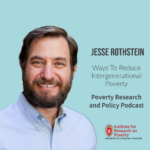- Greg Duncan, Mary E. Pattillo, Michael R. Strain, and Rita Hamad
- March 20 2024
- W110-2024




Mary E. Pattillo, Sociology and Black Studies, Northwestern University
Michael R. Strain, American Enterprise Institute
Rita Hamad, Department of Social and Behavioral Sciences, Harvard School of Public Health
Experiencing poverty in childhood can hinder a person’s opportunities throughout their lifetime, and those of their children and grandchildren as well. A new report from the National Academies of Sciences, Engineering, and Medicine (NAS) examines the causes of intergenerational poverty and its impact on families, communities, and the nation as a whole. In this webinar, four members of the committee that produced the report will discuss their findings on what data-driven policies and practices can interrupt this cycle that has negatively affected the health, well-being, and educational and employment outcomes of generations in some households, particularly those of low-income people of color.
Related Podcast

We also spoke with NAS committee member Jesse Rothstein about the report in a recent episode of IRP’s Poverty Research & Policy podcast.
Recording Of The Webinar
Additional Resources
Presentation Slides (pdf file)
Categories
Child Poverty, Children, Early Childhood Care & Education, Economic Support, Education & Training, Employment, Family & Partnering, Financial Security, Food & Nutrition, Food Assistance, Food Insecurity, Health, Health General, Housing, Housing General, Inequality & Mobility, Intergenerational Poverty, Job Training, Justice System, Juvenile Justice, K-12 Education, Labor Market, Low-Wage Work, Means-Tested Programs, Parenting, Postsecondary Education, Poverty Measurement, Racial/Ethnic Inequality, Transition to Adulthood, U.S. Poverty Measures, Unemployment/Nonemployment
Tags
Child Tax Credit (CTC), Earned Income Tax Credit (EITC), National, Race/Ethnicity